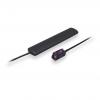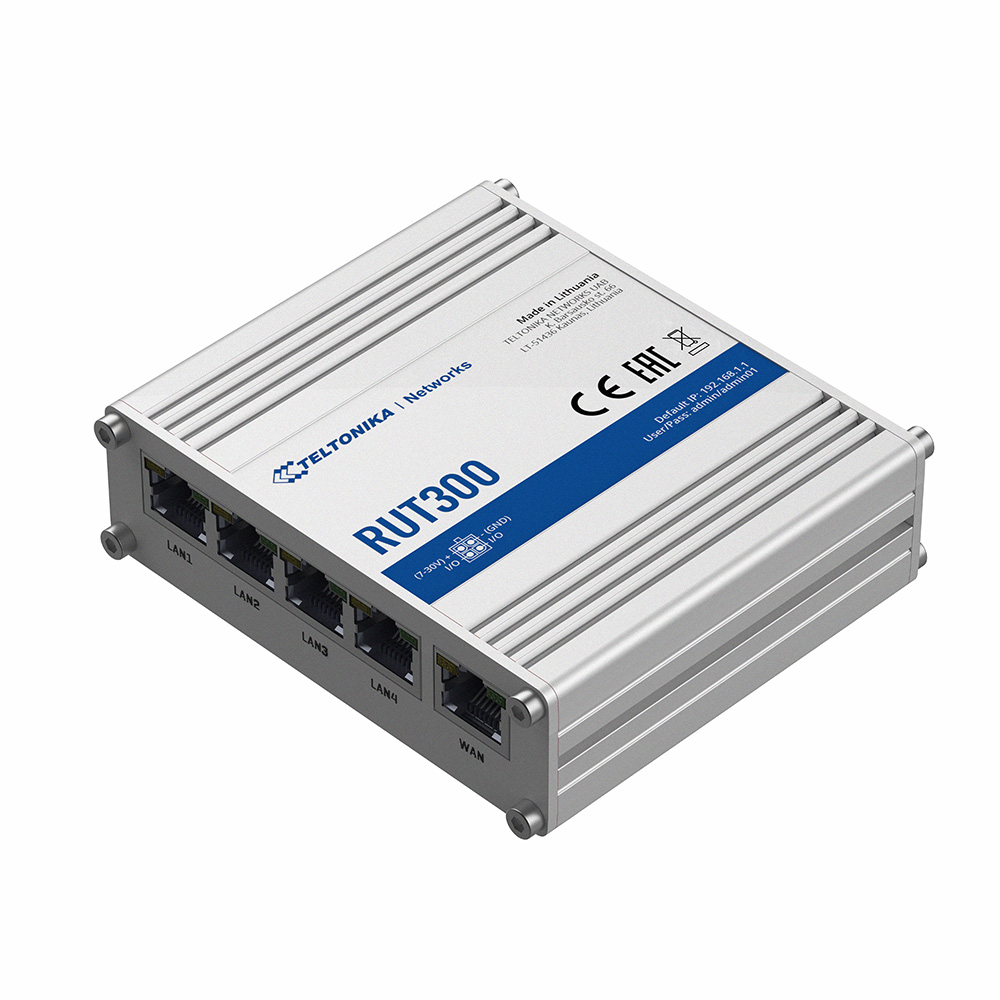-
zł
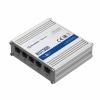
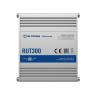
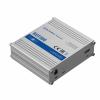
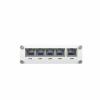
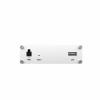
Teltonika RUT300 is an industrial router equipped with 5 fast Ethernet ports (10/100 Mb/s), including 1x WAN and 4x LAN. The device has a RutOS system based on the OpenWRT software. The heart of the design is the QCA9531 processor clocked at 650 MHz. The router has a durable, aluminum casing, it is able to work in difficult conditions. The software provides numerous management functions, including VPN (multi-standard support), VLAN, firewall or the possibility of using RMS (Teltonika remote system). An additional advantage is the USB port on the back of the housing.
5 fast Ethernet ports, powerful processor
The router is equipped with 5 fast Ethernet ports (10/100 Mb / s), including 1x WAN and 4x LAN. The device has a QCA953 processor clocked at 650 MHz and 64 MB RAM (DDR2).
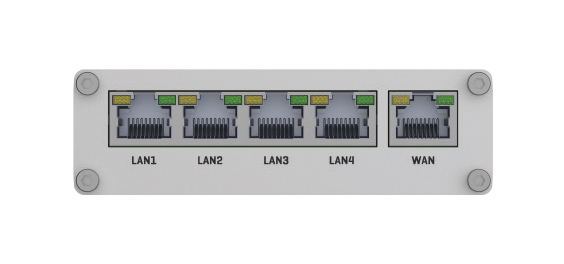
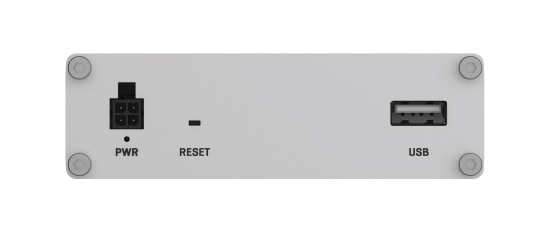
Digital I/O, USB port
There are also 2 configurable digital I/O connectors on the 4-pin power connector that enable events to be performed under certain conditions. An additional advantage is the USB port that allows you to connect an external hard drive or create a Samba server. The 4-pin connector is also used to connect the power supply, the set includes a 9 V DC, 1 A power supply. The device also has a passive PoE input, it can be powered via the LAN port.
VPN, VLAN, firewall
The offered product supports many VPN standards, including OpenVPN, IPSec, GRE, PPTP, L2TP, ZeroTier and WireGuard. It can handle up to 4096 VLAN IDs, it also supports firewall settings, through WebUI you can choose preconfigured rules, and using CLI you can create your own configuration.
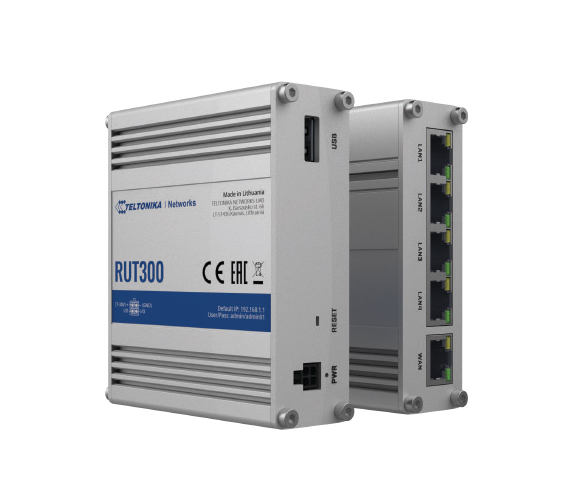
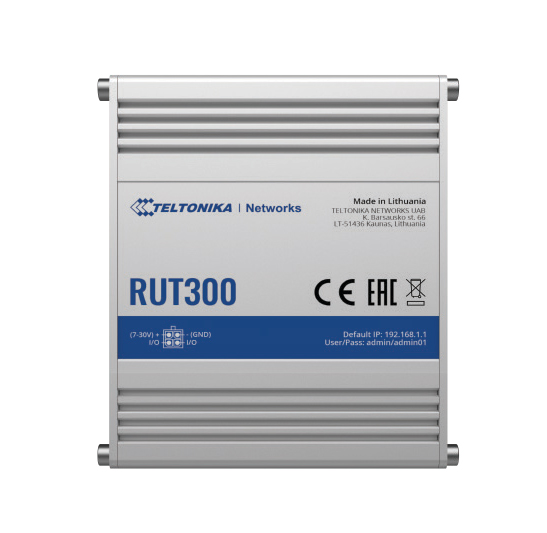
Remote control RMS / TR-069
RUT300 is compatible with RMS - remote management system developed by Teltonika. This system allows you to easily and conveniently configure devices and monitor their work. You can manage RMS from a computer or an application available for Android and iOS. Additionally, the router supports the popular TR-069 protocol, so you can connect it to the ACS server you are using and use auto provisioning.
Specifications
| RUT300 | |
| Ethernet | |
|---|---|
| WAN |
1 x WAN port, 10/100 Mbps, compliance with IEEE 802.3, IEEE 802.3u standards, supports auto MDI/MDIX crossover |
| LAN |
4 x LAN ports (can be configured as secondary WAN ports), 10/100 Mbps, compliance with IEEE 802.3, IEEE 802.3u standards, supports auto MDI/MDIX crossover |
| Network | |
| Routing | Static routes, Dynamic routes (planned) |
| Network protocols | TCP, UDP, IPv4, IPv6, ICMP, NTP, DNS, HTTP, HTTPS, FTP (planned), SMTP, SSL v3, TLS, ARP, PPPoE, UPNP, SSH, DHCP, Telnet client, SNMP (planned), MQTT (planned), Wake on LAN (WOL) (planned) |
| VoIP passthrough support |
H.323 and SIP-alg protocol NAT helpers, allowing proper routing of VoIP packets |
| Connection monitoring |
Ping Reboot, Wget reboot, Periodic Reboot, LCP and ICMP for link inspection |
| Firewall |
Port forwards, traffic rules, NAT rules, custom rules |
| DHCP |
Static and dynamic IP allocation, DHCP Relay |
| QoS / Smart Queue Manage- ment (SQM) (planned) |
Traffic priority queuing by source/destination, service, protocol or port, WMM, 802.11e |
| DDNS (planned) |
Supported >25 service providers, others can be configured manually |
| Network backup | Wired WAN options, each of which can be used as an automatic Failover |
| Load balancing | Balance Internet traffic over multiple WAN connections |
| SSHFS | Possibility to mount remote file system via SSH protocol |
| Security | |
| Authentication | Pre-shared key, digital certificates, X.509 certificates |
| Firewall |
Pre-configured firewall rules can be enabled via WebUI, unlimited firewall configuration via CLI; DMZ; NAT; NAT-T |
| Attack prevention | DDOS prevention (SYN flood protection, SSH attack prevention, HTTP/HTTPS attack prevention), port scan prevention (SYN-FIN, SYN-RST, X-mas, NULL flags, FIN scan attacks) |
| VLAN | Port and tag based VLAN separation |
| WEB filter (planned) | Blacklist for blocking out unwanted websites, Whitelist for specifying allowed sites only |
| Access control |
Flexible access control of TCP, UDP, ICMP packets, MAC address filter |
| VPN | |
| OpenVPN |
Multiple clients and a server can run simultaneously, 12 encryption methods |
| Szyfrowanie OpenVPN | DES-CBC, RC2-CBC, DES-EDE-CBC, DES-EDE3-CBC, DESX-CBC, BF-CBC, RC2-40-CBC, CAST5-CBC, RC2-64-CBC, AES-128-CBC, AES-192-CBC, AES-256-CBC |
| IPSec | IKEv1, IKEv2, with 5 encryption methods for IPsec (DES, 3DES, AES128, AES192, AES256) |
| GRE | GRE tunnel |
| PPTP, L2TP |
Client/Server instances can run simultaneously, L2TPv3 support (planned) |
| Stunel (planowane) | Proxy designed to add TLS encryption functionality to existing clients and servers without any changes in the program’s code |
| DMVPN (planowane) | Method of building scalable IPsec VPNs |
| SSTP (planowane) | SSTP client instance support |
| ZeroTier | ZeroTier VPN client support |
| WireGuard | WireGuard VPN client and server support |
| MODBUS TCP slave (planned) | |
| ID filtering | Respond to one ID in range [1;255] or any |
| Allow remote access | Allow access through WAN |
| Custom registers | MODBUS TCP custom register block, which allows to read/write to a file inside the router, and can be used to extend MODBUS TCP slave functionality |
| MODBUS TCP master (planned) | |
| Supported functions | 01, 02, 03, 04, 05, 06, 15, 16 |
| Supported data formats | 8 bit: INT, UINT; 16 bit: INT, UINT (MSB or LSB first); 32 bit: float, INT, UINT (ABCD (big-endian), DCBA (little-endian), CDAB, |
| MQTT gateway (planned) | |
| Gateway | Allows sending commands and receiving data from MODBUS Master trough MQTT broker |
| Data to server (planned) | |
| Protocols | HTTP(S), MQTT, Azure MQTT, Kinesis |
| Monitoring & management | |
| Web UI | HTTP/HTTPS, status, configuration, FW update, CLI, troubleshoot, event log, system log, kernel log |
| FOTA | Firmware update from server, automatic notification |
| SSH | SSH v1, v2 |
| TR-069 | OpenACS, EasyCwmp, ACSLite, tGem, LibreACS, GenieACS, FreeACS, LibCWMP, Friendly tech, AVSystem |
| MQTT (planowane) | MQTT Broker, MQTT publisher |
| SNMP (planowane) | SNMP (v1, v2, v3), SNMP trap |
| JSON-RFC | Management API over HTTP/HTTPS |
| MODBUS (planowane) | MODBUS TCP status / kontrola |
| RMS | Teltonika Remote Management System (RMS) |
| System characteristics | |
| CPU |
QCA9531, MIPS 24kc, 650 MHz |
| RAM | 64 MB, DDR2 |
| FLASH storage | 16 MB, SPI Flash |
| Firmware / configuration | |
| Web UI | Update FW from file, check FW on server, configuration profiles, configuration backup |
| FOTA | Update FW/configuration from server |
| RMS | Update FW/configuration for multiple devices at once |
| Keep settings | Update FW without losing current configuration |
| USB | |
| Data rate | USB 2.0 |
| Applications | Samba share (planned), USB-to-serial (planned) |
| External devices | Possibility to connect external HDD, flash drive, printer (planned) |
| Storage formats | FAT, FAT32, NTFS |
| Input / Output | |
| Configurable I/O |
2 x Configurable digital Inputs/Outputs. Digital input 0 - 5 V detected as logic low, 8 - 30 V detected as logic high. Open collector output, max output 30 V, 300 mA |
| Events | Email, RMS |
| I/O juggler | Allows to set certain I/O conditions to initiate event |
| Power | |
| Connector | 4 pin industrial DC power socket |
| Input voltage range |
7 - 30 VDC, reverse polarity protection, voltage surge/transient protection |
| PoE (passive) |
Passive PoE. Possibility to power up through LAN port, not compatible with IEEE802.3af, 802.3at and 802.3bt standards |
| Power consumption |
Idle: 1.3 W, Max: 3 W |
| Physical interfaces (ports, LEDs, antennas, buttons, SIM) | |
| Ethernet | 5x RJ45 ports, 10/100 Mbps |
| I/O | 2x Configurable digital Inputs/Outputs on 4 pin power connector |
| Status LEDs |
5x ETH status, 1 x Power |
| Power | 1x 4 pin DC connector |
| USB | 1x USB A port for external devices |
| Reset | Reboot/User default reset/Factory reset button |
| Physical specifications | |
| Casing material | Aluminium |
| Dimensions (W x H x D) | 100 x 30 x 85 mm |
| Weight | 229 g |
| Mounting options | DIN rail (with optional mounting kit), flat surface placement |
| Operating environment | |
| Operating temperature | -40 C to 75 C |
| Operating humidity | 10% to 90 % non-condensing |






 Polski
Polski English
English Italiano
Italiano Español
Español Čeština
Čeština Српски
Српски Deutsch
Deutsch Ελληνικά
Ελληνικά Slovenský
Slovenský

